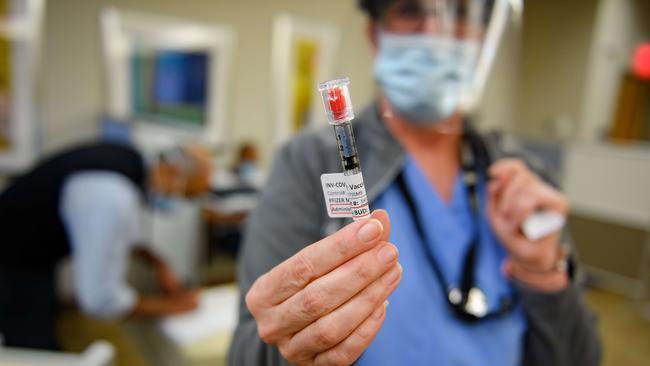
I’ve never had so many conversations about being vaccinated as in these past few weeks. Global eyes understandably have been fixed on the British rollout of the COVID-19 vaccine and now are turned to the US, Russia and others for the same reason. The comparative speed at which the vaccines have reached this milestone and the myriad related unknowns have been the subjects of many anxious conversations among friends and colleagues. The big question being: will you or won’t you roll up your sleeve?
If one thing has become clear as the vaccine has travelled the road from hope to reality, it’s that sensible, everyday Australians who normally would not blink at the thought of getting a jab are not just blinking, they’re baulking.
These folk aren’t the usual suspects. They don’t think COVID-19 is transmitted via 5G. They’re simply nervous about the speed at which this vaccine has been approved and unclear about potential longer-term side effects. They’re not whacko, just human.
Dig deeper and it’s simple. It’s not the vaccine, it’s the conversation around it. Talk of mandatory jabs. Vaccine passports. Ex-prime ministers lining up to be injected publicly. It’s all a bit weird. The truth is, the more coercive the vaccine rollout feels, the more resistance there will be.
When Qantas chief executive Alan Joyce announced the airline’s pending no-jab no-fly policy, the backlash was swift. The issue was that of choice. Qantas is free to enact any policy it wishes but it misjudged the timing and nature of its message. Ahead of the game or pariah — time will tell, but if the airline was looking to check the pulse, it found out.
Scott Morrison wisely has tempered his language since his initial “as mandatory as possible” line, telling voters this week that any Australian vaccine rollout will be done on our timeline, on our terms. Reassuring words for a hypersensitive population unsure about what they’re going to get.
This is a delicate conversation with a battle-weary nation. Add into the mix that we live in an era in which a scarily high number of people seem happy to swallow whatever fact-free anti-vax narrative is doing the rounds. Talk of a swift and potentially mandatory vaccine rollout without a concurrent and robust level of education on the basics will simply feed suspicion and resistance.
Respected infectious diseases specialist Clay Golledge is blunt when he says a COVID-19 vaccine is critical. A critic of the West Australian government’s prolonged hard border, Golledge says Australia is in the blessed position of being able to watch and wait. He also says messages have been mixed, the conversation didactive rather than explanatory.
“It’s important to understand that no vaccine has been taken off the market because of long-term serious side effects,” Golledge says. Unsurprisingly he says he’ll happily be first in line to bare his deltoid when the time comes.
“COVID is far, far worse than any potential problems with a vaccine,” Golledge says. “People can be confident that the speed at which this vaccine has come to market is what happens when bureaucracy is removed from the equation. Not checks and balances, not safeguards, but cumbersome processes that have developed over time.”
Making a vaccine mandatory comes with its own set of headaches, political and practical, and we are not having this conversation in a normal environment. The battle is not with the idea of the vaccine itself; rather, with how the conversation with a nervous population is being held, given this vaccine defies everything anyone has ever been told about how long it takes to get one safely to market.
Education is the missing piece, plain and simple. If we are to achieve the required level of uptake when the time comes, this dialogue can’t be at the point of a gun.
Gemma Tognini is executive director of GT Communications.




One of the more peculiar things I’ve experienced during a year of highly peculiar things has been the need to wear your health preferences on your sleeve. For example, I’m no anti-vaxxer. A child of the 1970s, you name it, I’m jabbed for it. I blame COVID-normal, whatever that is anyway.